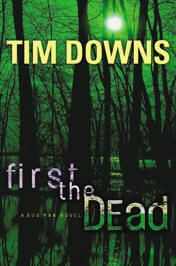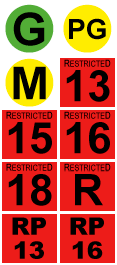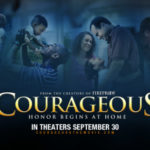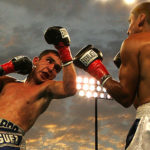Safe Fiction – Discernment, Tim Downs, And First The Dead
 A radio program I occasionally listen to, Family Life Today, ran a series of broadcasts discussing fiction with author Tim Downs, winner of the 2007 Christy Award for best suspense novel of the year for PlagueMaker. Downs’s next novel, First the Dead, features protagonist Nick Polchak, a forensic scientist (an entomologist, to be exact). I haven’t read the book, but from the radio discussion, I gleaned that these “bug book” stories could be considered a Christian version of CSI.
A radio program I occasionally listen to, Family Life Today, ran a series of broadcasts discussing fiction with author Tim Downs, winner of the 2007 Christy Award for best suspense novel of the year for PlagueMaker. Downs’s next novel, First the Dead, features protagonist Nick Polchak, a forensic scientist (an entomologist, to be exact). I haven’t read the book, but from the radio discussion, I gleaned that these “bug book” stories could be considered a Christian version of CSI.
At the end of the first day of discussion, the radio host began his wrap with something like, These books by Tim Downs are safe and entertaining, with a subtle message embedded.
Safe? I’d already been thinking about this topic as the men discussed the research Downs did to understand what a crime scene entomologist would have to do, and how Downs tried to steer into the waters of reality without swamping the expectations of bookstore owners and vigilant, pietistic readers.
It was clear the radio host had read the book. In fact, he mentioned receiving a pre-release copy, but what he didn’t know was what each of the listeners and potential readers were dealing with in their lives.
Is the book “safe” for someone who can’t watch CSI because of the gore? Is the book “safe” for someone who has experienced the ordeal of a murder in their family? Is the book “safe” for a five year old? a ten year old? a fifteen year old?
 Those questions may stretch the point, but here’s what I’m getting at: in declaring a book “safe,” it seems to me, the radio host was giving a “G” rating, a blanket endorsement. Such seals of approval, in my view, may snag an unsuspecting reader.
Those questions may stretch the point, but here’s what I’m getting at: in declaring a book “safe,” it seems to me, the radio host was giving a “G” rating, a blanket endorsement. Such seals of approval, in my view, may snag an unsuspecting reader.
Mind you, I know nothing about Downs’s First the Dead. Possibly, it is truly a book for all ages and stages, that no reader would have difficulty with any aspect of the story or the writing. That idea then prompts me to wonder if the “Christian” story isn’t a moralistic whitewashing of reality?
I suspect, instead, that there are hard looks at death between the covers of this novel. Downs indicated that one thing he wants to do with his fiction is “cross over,” to write a book that non-Christians might read, and leave them with questions to ask about … life, I suppose, or maybe after life.
What I’m wondering … really, what I’m doubting … is if one person can make a determination for another that a particular work is “safe.” Especially if that statement is aimed at millions of unknown listeners who tuned in to the radio on a particular morning.
As clarification, I’m a big fan of this program and the men behind the mic day in and day out. I think their stamp of approval, this declaration that Downs’s book is “safe,” was given with the best of intention. The host liked the book, liked Downs, and wanted to plug First the Dead with his audience, even though some of them might be the vigilant, pietistic readers who would squirm if a book in their local store contained cussing or sex or gratuitous violence.
It doesn’t have any of those, the radio host seemed to be saying, so come on in, the water’s fine.
What happens, then, to the discernment of individual readers? If a reader relies on the “expert” who judges a work to be “safe,” is that any better than relying on where the reader bought the book or what publisher’s imprint is on the spine? In all these cases, the reader is relying on someone else to do his thinking. And frankly, I don’t find that safe at all.
This article, not specifically about Christian speculative fiction but applicable to it, first appeared, minus some editorial changes, at A Christian Worldview of Fiction in June 2008.












































I agree that “safe” is an inexact word for a complex set of variables. And you are right that a reader shouldn’t rely on any one person’s opinion. We need to collect multiple data points about every book to prioritize our reading lists.
There are only two ways to discern whether a book will disturb you or not. One is to read it, and the other is to gather information from those who have. So unless every one of us is going to read every single book (don’t you wish we had time to do so?), we must rely on the discernment of those who have read the books we have not. Isn’t that what all the book reviews in the SpecFaith library are for?
Agree, Kristen. I rely a great deal on recommendations from people I know and trust. I don’t think that means I should give a book a pass, however, just because someone has took me the book is a must read or because someone like the guys at Family Life Today say the book is OK. I still think we need to be discerning readers—to pay attention to what a book is actually saying, and not simply how it is saying it.
Too many people think a book is “safe” for the wrong reasons. But I’ll explore that in another post down the line.
Becky
I much prefer the work of the Dove Foundation and Plugged In which provides specifics. Dove provides a recommendation based on whether it’s okay for 12 or above or whether its just okay, and Plugged in does age-based Green, Yellow, or Red. Unfortunately, neither does many book reviews.
I’m not really sure what the point of complaining about people recommending books and saying that readers rely on their own discernment. Should we pray over each book for twenty minutes before deciding whether to buy it? Or should we use our discernment when actually reading the book by which time we’ve already spent the money to buy it and may be tempted to finish it just because we want to know how it turns out? Or should we only buy the book once we’ve read all the reviews online in which case we’re merely shifting from relying on one opinion to relying on several? Or should we just get what we think might be interesting and only not do it if we feel a “check” from the Holy Spirit?
What are you practically saying readers should do? Using your own discernment is a spiritual/metaphysical concept. How practically are readers to do what you’re asking?
From what I read, Becky’s objection was more about someone declaring that a book was “safe” as if that blanket approval applied to all readers. A more-careful wording would have been more like, “I personally had no issues with it and loved it.” (And then it would an improvement over entertainment- or “values”-based pragmatism to say how the story reflected truth and beauty about God/man/the world contrasted with lies and ugliness, but then again, I would say that …)
Don’t think that’s how Scripture defines discernment (or the purpose of prayer).
I don’t see “checks” in the Bible, though we feel them often in our experiences — unfortunately though such “checks” are often attributed to personal revulsion or pleasure and have little to do with the Spirit’s leading. I get a “check” all the time about Twilight but it doesn’t tell me a thing about whether that series would actually be worth my time. The Spirit’s prime leading in discernment = Bible.
It starts to sound like “discernment” must be first defined and explored. As I’ve already alluded I would suggest these few definition tenets:
Adam, it’s really a negative. I’m saying readers should NOT check their brains at the door simply because someone they know and/or respect has given a book the “safe” award. Approaching reading that way is not discernment. Ever. No matter what person or rating organization has lent approval.
After all, these are people who are evaluating the books and stories. They are not beyond making errors in judgment. And we are only responsible before God for our own decisions. We can’t beg off by saying, But Focus on the Family said it was OK.
Becky
I haven’t read through all the comments, Becky, and I’m not sure if you’ve since read Downs’s Polchak series–but basically, this is a character who puts a criminal’s dead body in a trunk for entomological study as a form of personal justice. Polchak is not a good guy from the start, and trends to worse in the second book. It’s a big part of why I thoroughly enjoyed the storytelling.
The kind of person I know who needs a safety label on their fiction, would probably find the moral trend of the first two books… confusing. I think you’re right that people just have to know what suits their conscience and tastes, and not leave that decision-making in the hands of popular commentators.
C.L., thanks for adding to the discussion. I think what you’ve said verifies my point—someone else can’t be responsible for my decisions and I as a reader ought not to be looking for a list of approved books. That’s fine for kids, but as adults, we need to be thinking for ourselves (and teaching our kids to do so as well).
Instead, I see this trend to rely on “professionals who know” when making our reading decisions. Again, that’s OK if we’re researching what TV to buy or what car to purchase, but when it comes to things that involve our spiritual well-being such as what stories we read, there really is only one reliable source—Scripture.
Becky
(Stands up and offers a slow, ponderous clap)
Now I wish I had seen this piece the first time.
Stephen, I don’t know what you’re referring to. Did you mean to include a link?
Becky
Nope, my slow clap is in response to this very article.
OK, now I get it. (Context is everything!) Thank you. 😀
Becky
If the reader is so fragile that he might be offended by a mystery that won a prize for specifically Christian books, he should probably not read at all or stick to non-fiction. At some point we need to tell the weaker brother to grow up and stop being such a scaredy-cat.
DM, that’s harsh. And I think it misses the point. Just because someone tells you a book is safe is no reason to stop thinking about what it’s saying and simply put your mind on cruise control, letting the story take you where it will without interacting meaningfully with what it says.
Becky
The whole point of the Christy Awards is to recognize excellence in Christian fiction. We can debate about how well it lives up to this, but we’re talking about a book here that managed to get accepted at a mainstream CBA press, and also won an award given by people whose job it is to select spiritually wholesome fiction. If we have to be reminded to be careful about uncritically accepting this, I think we need to have a serious talk about when the desire for safety becomes a mask for hidden fear.
dm, I can’t agree with you there. Some folks DO have stuff in their pasts. I can handle some violence, but if it gets too gory, and especially women and children are involved, I truly CAN’T handle it. It is literally a trigger for me. Because of this, I asked, and was discouraged from reading the Hunger Games books. I didn’t check my head, and used discernment. I asked for specifics and folks gave it to me who knew my problems.
Others have their own issues of things. I have psychiatric problems like PTSD from Iraq, others have issues from past traums, such as some women and children subjected to rape or abuse. Others really are sensitive. We are all different and shouldn’t be mocked for it.
I think that some should rate books like I do IN PART. I don’t want myself looked to as an example as I’d probably wilt if I was held to be an example. 😉 I give enough details to know if something is too much for different age groups or those who have issues with things.
At the same time, I oppose the bean counters in the folks who say “x number of curse words, sex crap, nudity crap, etc.”. One CAN give details in vague without being graphic and missing the point of the book as the bean counters do. I try to do so, and my aforementioned friends who responded to my query of the Hunger Games (or Attack on Titan for that matter) also did so. Summations of content without the bean-counting.
You’re talking about extreme cases which cannot deal with things due to legitimate psychological trauma in the past, to the point where flashbacks can be induced from fictional material. I don’t think this applies to the general point, or is what I mean when I say “weaker brother.” This would be similar to the “don’t play games if you have a history of epilepsy” warning on video games, or even dealing with colorblindness in gaming; there’s only a limited amount that can be done when a person has physical reactions to something. They can’t make games that will always not trigger epilepsy in someone predisposed to it.
Most arguments about safety in fiction are more about moral as opposed to physical reactions. I’m a little annoyed (sorry Rebecca) that we have to screen a work like the above for moral safety for Christians. I’m really okay with the point generally, but if we can’t relax around a Christy winner, I think it’s fair to start asking about at what point the desire for safety is becoming toxic.
Also much prayers for you, man.
DM, I don’t know. You seem to be missing the point. I don’t want anyone “screening the work” and especially not for “moral safety” for Christians or for anyone. Discernment has to do with judging what is true and consistent with God’s word.
Why would we “relax” our judgment simply because a book has received an award? Because someone else did or didn’t flag a book should have no impact on me. I should still be measuring input, not based on what people say but on what God says.
Not that this is without its own need for clarification. People proclaimed Harry Potter was of the devil and that their judgment was based on Scripture. But what followed highlights the problem I’m addressing here: because Big Name So-and-So said Harry Potter was of the devil, scores of Christians denounced it, without an ounce of discernment. They were merely parroting what someone else had said, without thought.
And I’m sorry, DM, I don’t think there’s anything toxic about thinking. I do think searching for some “safe place” is folly, which is what drives a lot of people to sites that basically do their thinking for them.
My belief is that review sites are absolutely fine, but the people who use them should no more check their brains at the home page there than they should at page one of a book.
I suppose I’ve listened to too many respected pastors say over and over again: Don’t take my word for it; check the Scriptures. There are people all over the country sitting with their Bibles closed and taking in all kinds of error because Big Name So-and-So said it.
If a pastor can be in error, why not a novelist? An imprint? An awards committee?
Why is it threatening to say, think about what you read?
Becky
Maybe it would help if I broke my thoughts down into a list.
1. There’s a Christian radio program that I trust enough to be a regular listener. One day the host recommends a new novel.
2. The novel is by a Christian publisher. Generally Christian novels aren’t things I have to worry about for problematic moral content. If anything they sometimes go too far in the other direction; being too sanitized. It had to pass theological muster and survive the approval process.
3. The novel has won an award for being an excellent Christian novel. So there’s another set of filtering; not only did it make its way through the publication gauntlet, people thought it enough of merit to send it through the awards process, where it beat out other books.
4. Despite all this, you feel the need to mention that we shouldn’t turn off our mind and a book like this might very well not be safe for everyone.
I mean realistically, what are the chances of the entire Christian supply chain breaking down that you need to worry about this? It’s just the example you picked and your worries that it might not be safe due to the author stating he might want to cross over is to me a little too much. It feels like that even if you jump through all of those hoops, Christians will always suspect your work might be dangerous.
DM, we really are missing each other on this. You said
I have no worries because the author wanted his book to cross over. I’m astonished that you think this article is about this one book.
I am saying that NO BOOK is safe. SAFE DOES NOT EXIST.
Sorry for shouting there. 😉 Just needed to make the main point visible. Look, David, we all sin. All of us. That’s why I mentioned the pastors who have said often that we who listen are not to take their word for what they’re teaching but we are to examine the Scriptures.
There simply are no exceptions. We should think about what we ingest because it affects our spiritual lives. Would we grab meat from our local market and not check the expiration date or take it back if it looks tainted or smells foul? I mean, we wouldn’t simply say, Well, I got it at Krogers, so it’s bound to be wholesome.
If we’re careful with what we put into our bodies, how much more careful and thoughtful should we be about what we put into our minds and hearts? And there’s the place where I don’t think anyone can know for anyone else what will or will not be good for them, or bad.
I am so thankful I thought for myself when it came to the Harry Potter books. How many people repeated the warnings they’d heard from this Important Pundit or that: stay away from those books that oppose God’s word. Well, guess what? When I explored them, I didn’t find them to be opposing God’s word.
You’ve got it backwards, David. Thinking for ourselves is not a search for SAFE. It’s a recognition that the only safe place is God’s word and all else has to be measured by it. That’s not a job we should leave up to someone else to do for us. It’s a job we should do for ourselves.
And when we find something we think clashes with God’s word, we should say so—expose it to the light, not to be the new thought police but to give people something else to think about.
Becky
At some point we need to relax and not be afraid that everything has the potential to hurt us, especially in fiction. I’m not saying to turn the brain off, but that it’s wearying to always approach even Christian works with the idea that they can hurt us.
You mention the Harry Potter bashing books. It’s not a new thing; I was reading them in the 80s when instead it was Star Wars being bashed. They actually are the dark side of your point; books like those relentlessly analyze the pop culture of the moment against the Word and give laundry lists of reasons why a believing Christian shouldn’t touch them. That they often analyze a stereotype or have bad arguments works against them, but if they would just relax some and trust individual believers who are guided by the Holy Spirit, we’d have a lot less issues.
Sorry, it was just the specific example that really got me. I know about testing things against the Word, but too much of this can leave a person tense, mistrustful, and afraid. Reminds me of The Croods; Always never not be afraid.
I think I see now where we disagree, DM. You said
I don’t think we should relax. Peter said
I think those are words for us in every situation.
At the same time, I see nothing in the admonition to be on the alert (which Paul also repeats from time to time) that connects the command with fear. I don’t think we should be alert because we are fearful. He who is in us is greater than he who is in the world.
Being alert is not the same as being fearful. Not at all. The former is wise; the latter, weak. I don’t think fearful people patrol on the alert. Fearful people hide. In the context we’re discussing, I think fearful people are more apt to hide in the safety of someone else’s declaration that a work of fiction passes inspection. So we can relax, let down our guard, you won’t be hurt by this, you poor fearful soul.
Well, that’s wrong thinking. Satan masquerades as an angel of light; false teachers are wolves in sheep’s clothing, climbing over the fence into the fold.
We are to be diligent, not because we are fearful, but because we’re on the front lines and the battle is real. The fearful retreat, cower, hide, duck. They aren’t standing firm in their faith. They’re relying on the faith of others, the discernment of others, the study of Scripture by others.
OK, I’ve ranted enough. I’ll let you have the last say. 😉
Becky
I oppose the “bean counters” too (good term). Approaching literature that way misses what stories are actually accomplishing. It puts the focus on the wrong things and gives a picture of stories that might be artificial.
I appreciate your vulnerability in explaining your own reaction as an example of my point. Thanks for bringing a real person our attention so that we’re not merely talking about hypothetical people “out there.” In our society, I don’t think your story is exclusive.
Becky
From the other side, (when I’ve tried to suggest material), there’s the fear of people coming back to you and going ‘i didn’t expect x, y, z, why did you suggest this?’ It’s never happened to me, but even with fanfic recommendations, I feel the need to clarify that it may have content some people may be uncomfortable with.
I think Becky’s point is spot on. Quite aside from the issue of whether we should be trying to determine how safe a novel is, in general, because a trusted individual says it is doesn’t mean you should check your brain in before opening up the book.
Same goes for listening to your preacher at church. Singing songs at church. Listening to Christian music. Chatting with your best friend. Chatting with Franklin Graham. Reading the hottest selling non-fiction author. Or reading a Christi winner.
But that’s what some people do. They see “Christian” before the media or hear a respected person praise it, and the discernment sensor we might use in reading a general market book gets shut down for the “approved” book. No matter the reason, that is dangerous because none of us are infallible.
Rick, you’ve articulated the point clearly. I don’t think it is EVER acceptable for a Christian to let someone else do his thinking for him. We should be thinking about what we see, hear, read. Worship songs are a great example: there are more than a few that espouse things that aren’t theologically sound. Yet they seep into our belief system, past any checks we might normally have in place because we’re singing them in church!
I don’t care what organization puts an award on a book, or what reviewer recommends it, or what writer endorses it. None of those mean I have a pass not to think about what the book is saying.
Becky
Not long ago I started calling this “outsourcing discernment.”
Other Christians’ experiences and views are helpful for our Biblical discernment. Such discernment is indeed a community project in the body of Christ with all its uniquely gifted members. But they are no replacement for personal evaluation of a Thing.
The point is especially sound when it goes both ways: we should not outsource our discernment to any other Christian either to approve or condemn any story or Thing.
I know that you are not talking about this specific Tim Downs book, but rather using the book as an example. Still, I would like to say I LOVE Tim Downs’ Bugman series. Yet I was surprised to hear this book was given a general SAFE pass. His descriptions of the results of violence and subsequent decay are extremely graphic, appalling in some ways, and delightful in others. I would NOT give the Bugman books to preteens. I would not give the books to people with delicate stomachs. Yet I was delighted to pass on the novels to friends.
“Aslan is a lion- the Lion, the great Lion.”
“Ooh” said Susan. “I’d thought he was a man. Is he-quite safe? I shall feel rather nervous about meeting a lion”…
“Safe?” said Mr Beaver …”Who said anything about safe? ‘Course he isn’t safe. But he’s good. He’s the King, I tell you.”
C. S. Lewis, The Lion, the Witch, and the Wardrobe
*deep breath*
I’m always the odd one in these discussions, but . . . I don’t think *any* of our fiction should be “safe.” It should challenge us on multiple levels. There’s nothing “safe” about the Bible, either, except for the security offered through Christ’s sacrifice.
Here’s the definition of “safe”:
1. Secure from liability to harm, injury, danger, or risk;
2. Free from hurt, injury, danger, or risk;
3. Involving little or no danger of mishap, error, etc.;
4. Dependable or trustworthy;
5. Careful to avoid danger or controversy.
I would say that a Christy Award-winner probably falls under #3 above because the Christy Awards fall under #4 above. So yeah, they’re safe for most people, and therefore, you can say they’re generally safe. For the small part of the population the book *isn’t* safe for, there’s probably no amount or type of warning or guideline that’s going to help.
And maybe it’s my GenX leanings, but I just kind of resist any effort to put warnings on anything. I remember reading Stephen Donaldson years ago, and when the main character raped a girl and showed zero remorse, I threw the book away and swore to never touch that author again. That was my choice. I didn’t need a trigger warning to tell me it was in there. And honestly, I think I’m stronger for making that choice myself when I came across the scene rather than being warned away from it before I even cracked the book open.
But that’s me. I’m a little too libertarian for most Evangelical circles. And I probably shouldn’t be here, anyway. I say I’m not going to comment, then I read something and think of something to say, argue with myself about whether to post it, lather, rinse, repeat . . . Feel free to block me anytime.
(All this said, yes, I do use parent guides to evaluate movies, and no, I don’t go strictly by rating systems or reviews. For us, when evaluating what we let our teens/tweens watch, we generally don’t mind too much swearing or violence. We just want to know if we should fast-forward any sex scenes. And yes, our guidelines are more lax on books than they are on movies. We just have a lot of talks about discernment.)
I know that feeling. It’s not healthy to have a compulsive need to comment, to express your own cynicism all the time in your favorite Internet circles — but it’s so hard to stop. I usually hate myself a little more after every comment, worrying that I’ve hurt the discussion or the greater community, that I might have made someone’s day and/or life a little darker. So, if there’s a ban-wagon departing anytime soon, the admins can throw me on it, too. 🙂
I’ve not seen anything ban-worthy from either of you. My rule is as long as people are respectful of one another, you can disagree all day long. Depending on particulars, that is generally healthy. Iron sharpens iron, and all that good stuff.
Now if I were infallible, I’d have a different opinion. 😉